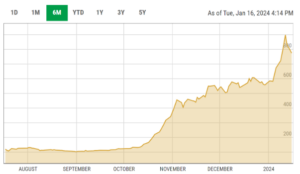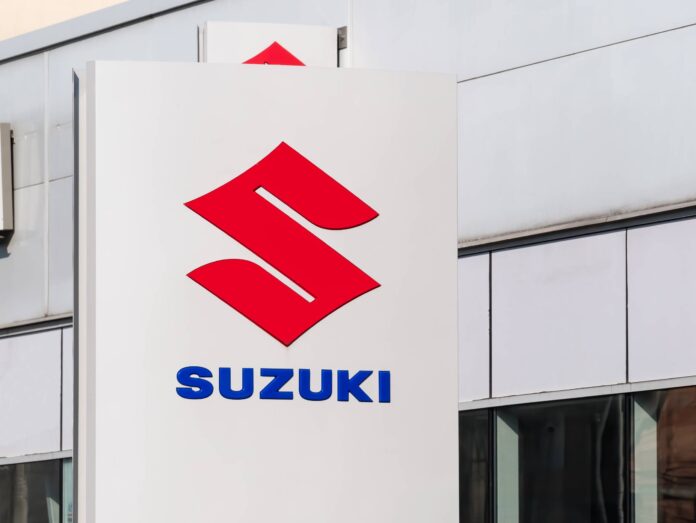The rollercoaster ride that has seen the price of Suzuki Pakistan’s stock soar in the past few weeks has taken a new turn. Almost immediately after the PSX announced a minimum share price of Rs 609, a surprise minority shareholder has made an entry with a recently acquired 10% stake in the company.
Pak Suzuki, which is a publicly listed company, is in the process of delisting itself from the stock exchange. While the company is an independent entity, the majority of its shares are held by Suzuki Japan which owns roughly 60 million of the 82 million outstanding shares. This leaves a total of 22 million shares that are held by other investors.
In order to delist, Suzuki Japan has to acquire over 90% of the shares in the company. The process behind this is simple enough.
Pakistan Stock Exchange has given a price of Rs 609 per share to Suzuki — known as Pak Suzuki in Pakistan — to carry out their voluntary delisting from the stock exchange. The price quoted by the Pakistan Stock Exchange (PSX) is 50% compared to the price that the company quoted themselves. The question now is, will the shareholders sell at this price?
This publication has covered this matter extensively in terms of the valuation of the company.
Read more: Pak Suzuki: things are not all they seem to be
The crux of the matter is that the company is looking to buy back all the shares in the market. Suzuki Japan —Suzuki Motors Corporation that is the parent company of Pak Suzuki — owns
Once the company has decided on the price, the next step is for the PSX to carry out its own due diligence and fix a price according to Regulation 5.14.2. This price has now been announced as Rs. 609 per share. Suzuki now has 10 days to accept this price or reject it. If the price is rejected, the buy back will be considered null and void.
So what about the shareholders in all of this?
Currently, 22 million shares are held privately by individuals and institutions outside the company itself. At the price given by PSX, the value of the buyback will be around Rs 13.5 billion while at their own price, the cost would have been Rs 9 billion. This is the value that will be generated and distributed to the shareholders.
Ever since the buyback was announced, the market has shown a positive response. The share price was languishing at Rs. 150 in October and has touched a high of Rs. 898 in January of 2024. This shows that the shareholders are expecting a higher price for their shares compared to the one announced by the company and the exchange.
Once the market became cognizant of the price that would be given by the PSX, the share price actually decreased to Rs. 716 on 16th of January. Even if the cost is higher, there are murmurs that the price will be agreed upon as the company strongly feels that delisting is the best course of action going forward. Analysts stated that due to the market share and the footprint of the company, the premium of 50% is still attractive.
In case that there is a disagreement over the price, the company has the opportunity to buy a minimum amount or the price, the company has a chance to appeal this decision but the decision taken by the PSX is considered final and bidding.
The PSX has set a quantum or threshold that needs to be crossed. Clause 5.14.5 states that if a sponsor initially had a shareholding of less than 90%, they need to at least increase their holding to 90% to qualify for the delisting. In cases where their shareholdings are above 90%, they do not need to carry out any mandatory additional purchase to qualify for the delisting.
This would mean that even if the company looks to meet the minimum threshold, they will still need to buy an additional 13.8 million shares which could cost them Rs 8.4 billion to cross the mark of 90% shareholding.
Why Delist?
The company has experienced losses in three out of the last four years and has not distributed any dividends. Additionally, the share price is currently at an all-time low, and shareholders face challenges exiting the market due to low volumes. As per the company’s version, it intends to repurchase all its shares and maintain a long-term commitment to the Pakistani market.
While the company may view this as a plausible decision, some investors might perceive it as disregarding their preferences and imposing a choice upon them.
However, there can be three possible reasons behind this buyback strategy. Firstly, the company may believe it is preferable to exit the country due to limitations on repatriating earnings imposed by the State Bank of Pakistan.
Secondly, Pak Suzuki might aim to reduce compliance requirements and information dissemination by delisting from the stock market.
Lastly, the company might be anticipating a positive turnaround, supported by recent financial performance that demonstrates a shift from losses to profits, as well as a recovery in vehicle sales. In addition, the expected decrease in the policy rate and potential increase in lending within the automobile sector contributes to this optimistic outlook.
What will the shareholders do?
The market, however, has already reacted. Initially the market saw an increase in the price from Rs 150 to Rs 898. This shows that the market expected that the price will be much higher than the one quoted by the company and the exchange. Since the announcement was made, the market has also seen the price crashing with the current price at Rs 716. It is expected that the price will finally settle at Rs 609 as that is the most that the company is willing to pay.

Experts still feel that the price is below expectations. “We believe the proposed minimum buy back price may have fallen below street expectations keeping in view potential revaluation gains as well as the company’s dominant position in the local automobile assembling space. Our view is that the investors will be unwilling to offer their shares at the proposed price keeping in mind that the market value of the company” says Kailash Kumar, an analyst at KTrade.
“The Voluntary Committee’s decision to set the delisting offer for PSMC at Rs609/share, indicating a 50% rise from the initial minimum price of 406, might not be received favorably by PSMC investors. Their dissatisfaction could arise from the offer price being 21% below the stock’s last closing. In contrast, let’s consider another international deal of Unilever, where the final price of Rs15,000/sh was higher than the minimum price of Rs9,700/sh by 54%, but it was also about 35% higher than the stock’s last closing before the final price announcement by the Exchange.” states a senior analyst at a brokerage house.
The price of Rs. 609 would seem attractive to investors who bought the shares initially. “Its 6x the price compared to when it was announced (which means its a) fair deal for shareholders who had bought before the announcement.” opines Yousuf Farooq, Director Research at Chase Securities.
Farooq further states that some participants might argue that the price is low as Suzuki is a much more valuable asset but it needs to be put into context that the price being offered is 6 times the price when the buyback was announced. Chase Securities actually gave a buy recommendation for the stock back in August when it was trading at Rs. 100.
They would be more than happy to sell the shares to the company. But what about the investors who bought at Rs. 898 expecting the price to keep increasing? Do they have a recourse in this matter?
Past examples show that shareholders have shown their displeasure at the rate given by the exchange itself. Unilever Pakistan carried out their buyback in 2013 and gave a price of Rs. 9,700 per share. When the decision was left to the exchange, they settled on a price of Rs. 15,000. Acacia Partners — a New York based hedge fund — said in the case of Unilever that these rules overlook the minority shareholders and said that they would reduce their investment in Pakistan due to the existing rules.
The rules are made in a way that the shareholders have to sell the shares at the price decided by the exchange or wait it out as a block. In case the company is not able to carry out the buyback of at least 90% of the shares in a period of 12 months, the buyback can be cancelled.
On 12th January 2024, a letter was sent by Nadeem Nisar. In the letter sent to PSX, it was stated that Mr Nisar had accumulated more than 10% of the shareholding of Suzuki and that as he had crossed the 10% threshold, he was making the company and the exchange aware of this fact. In essence, it was an announcement by the individual that he had the power to cancel the buyback by not selling any part of his shareholding to Suzuki.
For people who might not know, Nadeem Nisar is the son of famous trader Nisar Dunka who actively traded and held stocks during the 90s.
This means that the buyback can be cancelled if this individual holds out and does not sell his shares at the price quoted and then the company and stock exchange will have to cancel the existing buyback and carry out a new one. Nisar sent the letter to PSX before the rate was disclosed by the exchange on 15th of January and controls the fate of this buyback all by himself.
Now what are the options available to Nisar. First of all, he can let the buyback expire in 12 months time and not sell any of his shareholding in the company. This will mandate the company and exchange to make a better offer in the future. The second option he has is to carry out negotiations with the exchange and the company and look to broker a deal on the side which circumvents the buyback and looks to resolve the issue in timely manner. This option will have to go around the exchange as the exchange cannot revise its current rate as it is considered final and binding. Such an off-market deal might be quite profitable.
These are the two most plausible options he has. The last option he has is to sell only a small part of his holding and allow the buyback to go through while staying a shareholder in a private Suzuki company. This seems unlikely as he will have little interest in an unlisted company having little to no say in how it is run.





GOOD KNOWLEDGE OF ALL MARKET COMPANIES.
Get 10k from Japnese, they have accumulated high profit from selling cheap quality and old fashioned cars in Pakistan.We are with you Son of Dunka bhai.